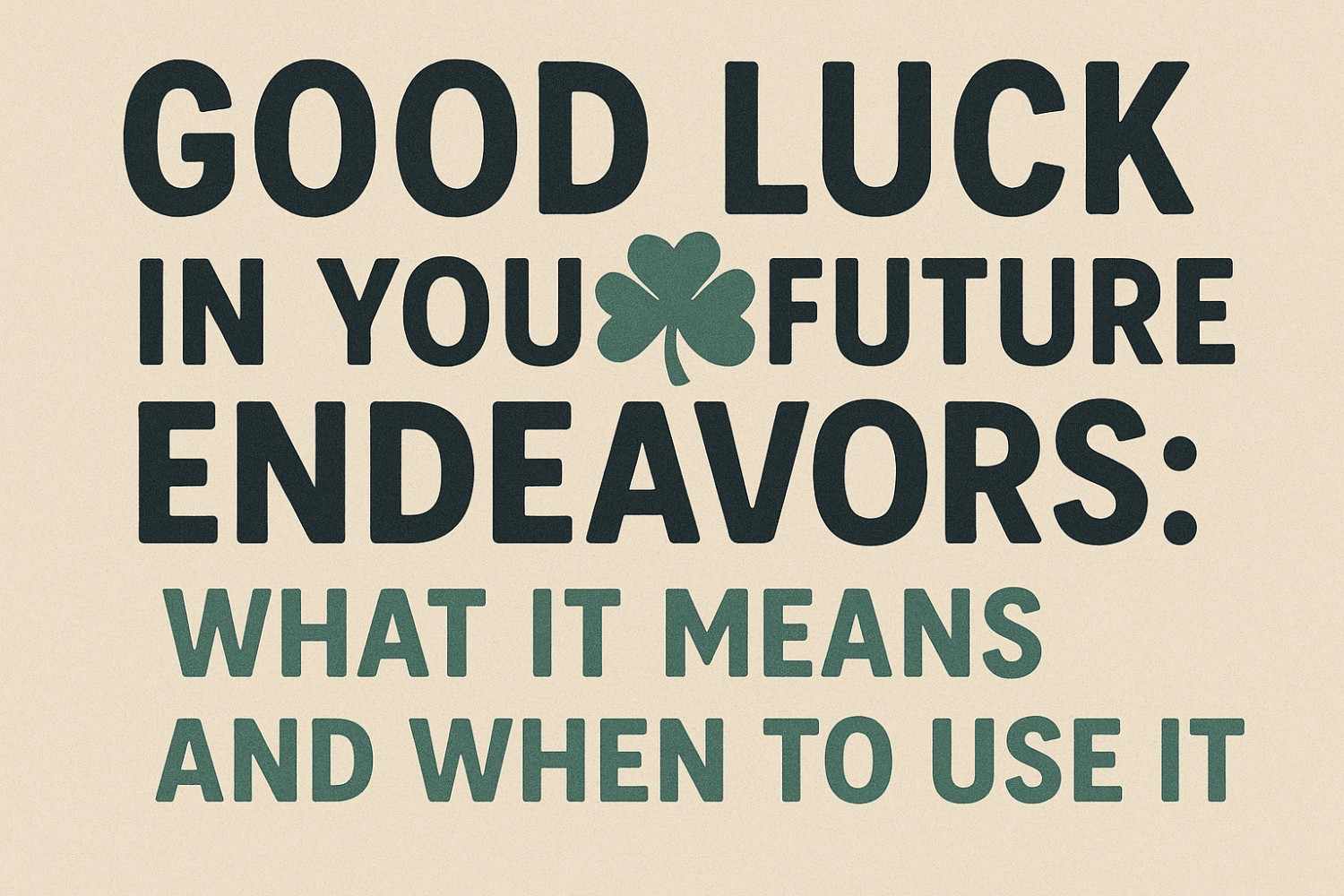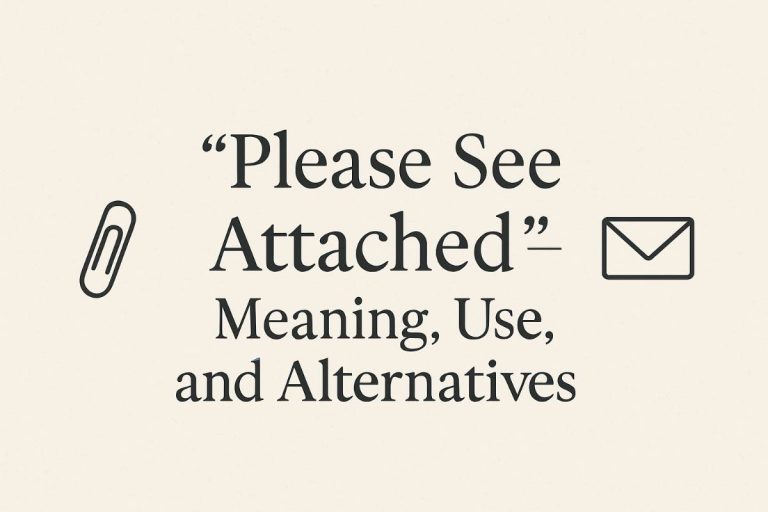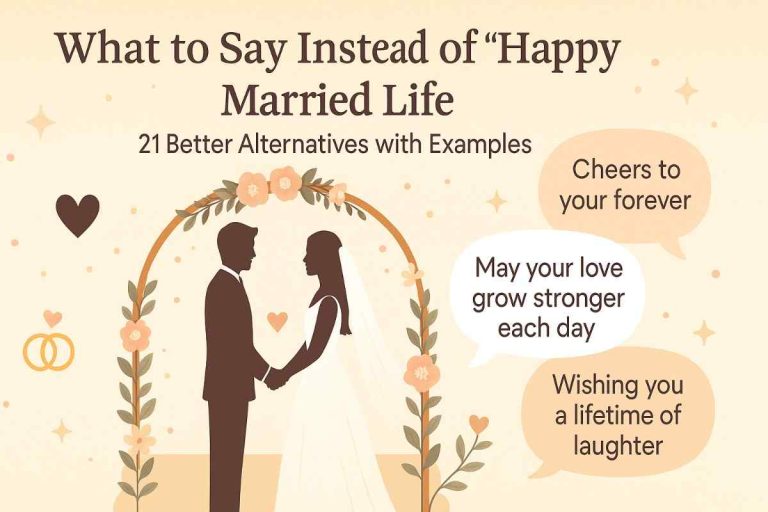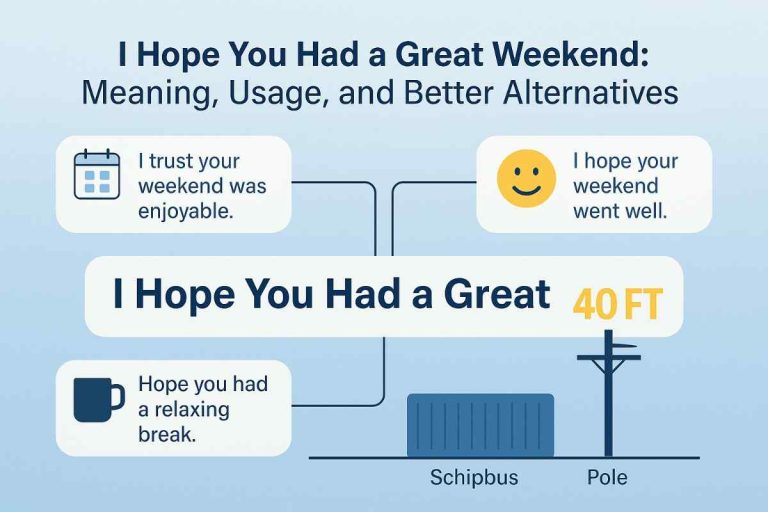Good Luck in Your Future Endeavors: What It Means and When to Use It
We’ve all heard it—“Good luck in your future endeavors.” It rolls off the tongue like a polite farewell. Maybe you read it in a goodbye email, or someone told it to you after a job interview. On the surface, it’s friendly. But is there more to it?
Let’s break it down, see when it fits, what it really means, and even what to say instead if you want to sound more personal.
What Does “Good Luck in Your Future Endeavors” Really Mean?
At its core, this phrase is simple: it’s a wish. You’re telling someone, “I hope things go well for you in whatever you do next.” But the tone? That can vary.
Sometimes it’s sincere. A manager might say it when an employee is moving on to a better opportunity. Other times, it’s a bit… distant. Think of a company letting someone go—they want to keep it professional, so they say something neutral like this.
Here’s the thing: the phrase is formal. You won’t hear it much in casual talk. It’s not something you’d say to a friend who’s moving to a new city. You’d probably say, “Good luck out there!” or “Wishing you the best!”
So why do people use it? Because it’s safe. It doesn’t show too much emotion. It’s polite. It’s kind of the corporate version of a handshake.
Common Situations Where the Phrase Is Used
This phrase shows up in more places than you might think. Some of them are warm and genuine. Others? More like a polite goodbye in disguise.
1. Job Changes or Resignations
Whether someone is leaving for a new role or being let go, this phrase often pops up in farewell emails or HR memos. It signals closure. It’s a way to move on without hard feelings—or at least without showing them.
2. Graduations or Retirements
If someone’s finishing school or ending their career, “Good luck in your future endeavors” fits well. It’s formal enough for speeches or yearbook messages but still personal enough to feel thoughtful.
3. End of a Business Partnership
Sometimes business ties end. Maybe it’s mutual. Maybe it’s not. Either way, people use this phrase to keep things civil. It’s the adult version of saying, “No hard feelings.”
4. Emails or Letters After Interviews
Let’s say you didn’t get the job. Some companies include this line at the end of a rejection email. It stings a bit, but it beats silence. At least they’re wishing you well… sort of.
5. Personal Goodbyes With Distance
In some breakups—friendship or romantic—someone might use this phrase if they want to stay respectful but distant. It’s like saying, “I’m not mad, but we’re done.”
You may like this – How to Say ‘Thank You for Your Concern’ – Examples & Meaning
Other Ways to Say “Good Luck in Your Future Endeavors”
Now, maybe you’re writing a message or speaking at an event, and this phrase feels too stiff. Good news—you’ve got options. Lots of them, actually.
- “Wishing you all the best in what’s ahead.”
It feels warmer, more human. - “Here’s to whatever comes next!”
Casual and hopeful. - “I know you’ll do great things.”
A little more personal. Shows faith. - “Take care, and good luck with everything!”
Light and friendly. - “You’ve got this—can’t wait to see where life takes you.”
Confident, supportive, and ideal for people you’re close with.
The goal here? Match your message to the relationship. If it’s a coworker you barely know, formal might be fine. But for someone you admire, care about, or have worked closely with? Go a little deeper.
How to Respond When Someone Says It to You
Let’s flip it. What if you’re the one hearing this phrase?
Maybe you’re moving on from a job. Or someone’s ending a relationship. How should you answer? That depends on the tone they’re using—and how you feel about the situation.
Here are a few ways to respond:
- “Thank you—I appreciate that.”
Simple and respectful. Good for any situation. - “Thanks. I’ve enjoyed working with you.”
Adds a personal touch if it’s a workplace setting. - “Same to you—I hope everything goes well on your side too.”
Keeps it balanced and kind. - “I’ll take that luck and run with it!”
Lighthearted, good if you want to keep things upbeat.
Now, if you sense the phrase was a little… dismissive? Like in a breakup or a job rejection? You can still be gracious. You don’t need to over-explain. A short “Thanks—take care” does the trick.
Conclusion
So, what’s the deal with “Good luck in your future endeavors”?
It’s polite, a little formal, and sometimes used to soften hard moments. But it’s also a way to say, “I’m stepping back, but I wish you well.” In workplaces, schools, even personal goodbyes—it shows up all the time.
If you’re using it, think about how close you are to the person. Sometimes the phrase fits. Other times? You might want something more real, more you.
And if someone says it to you? Take it for what it is—a sendoff. Whether it’s warm or a little cold, it’s a sign you’re moving forward.
And honestly, isn’t that what matters most?







